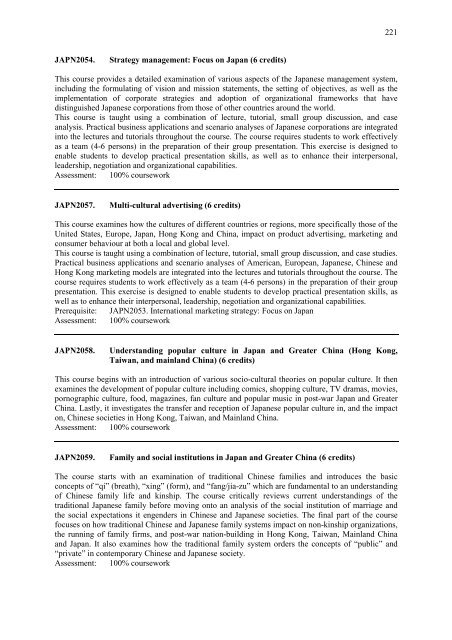(BA) (4-year-programme) - The University of Hong Kong
(BA) (4-year-programme) - The University of Hong Kong
(BA) (4-year-programme) - The University of Hong Kong
You also want an ePaper? Increase the reach of your titles
YUMPU automatically turns print PDFs into web optimized ePapers that Google loves.
221JAPN2054.Strategy management: Focus on Japan (6 credits)This course provides a detailed examination <strong>of</strong> various aspects <strong>of</strong> the Japanese management system,including the formulating <strong>of</strong> vision and mission statements, the setting <strong>of</strong> objectives, as well as theimplementation <strong>of</strong> corporate strategies and adoption <strong>of</strong> organizational frameworks that havedistinguished Japanese corporations from those <strong>of</strong> other countries around the world.This course is taught using a combination <strong>of</strong> lecture, tutorial, small group discussion, and caseanalysis. Practical business applications and scenario analyses <strong>of</strong> Japanese corporations are integratedinto the lectures and tutorials throughout the course. <strong>The</strong> course requires students to work effectivelyas a team (4-6 persons) in the preparation <strong>of</strong> their group presentation. This exercise is designed toenable students to develop practical presentation skills, as well as to enhance their interpersonal,leadership, negotiation and organizational capabilities.Assessment: 100% courseworkJAPN2057.Multi-cultural advertising (6 credits)This course examines how the cultures <strong>of</strong> different countries or regions, more specifically those <strong>of</strong> theUnited States, Europe, Japan, <strong>Hong</strong> <strong>Kong</strong> and China, impact on product advertising, marketing andconsumer behaviour at both a local and global level.This course is taught using a combination <strong>of</strong> lecture, tutorial, small group discussion, and case studies.Practical business applications and scenario analyses <strong>of</strong> American, European, Japanese, Chinese and<strong>Hong</strong> <strong>Kong</strong> marketing models are integrated into the lectures and tutorials throughout the course. <strong>The</strong>course requires students to work effectively as a team (4-6 persons) in the preparation <strong>of</strong> their grouppresentation. This exercise is designed to enable students to develop practical presentation skills, aswell as to enhance their interpersonal, leadership, negotiation and organizational capabilities.Prerequisite: JAPN2053. International marketing strategy: Focus on JapanAssessment: 100% courseworkJAPN2058.Understanding popular culture in Japan and Greater China (<strong>Hong</strong> <strong>Kong</strong>,Taiwan, and mainland China) (6 credits)This course begins with an introduction <strong>of</strong> various socio-cultural theories on popular culture. It thenexamines the development <strong>of</strong> popular culture including comics, shopping culture, TV dramas, movies,pornographic culture, food, magazines, fan culture and popular music in post-war Japan and GreaterChina. Lastly, it investigates the transfer and reception <strong>of</strong> Japanese popular culture in, and the impacton, Chinese societies in <strong>Hong</strong> <strong>Kong</strong>, Taiwan, and Mainland China.Assessment: 100% courseworkJAPN2059.Family and social institutions in Japan and Greater China (6 credits)<strong>The</strong> course starts with an examination <strong>of</strong> traditional Chinese families and introduces the basicconcepts <strong>of</strong> “qi” (breath), “xing” (form), and “fang/jia-zu” which are fundamental to an understanding<strong>of</strong> Chinese family life and kinship. <strong>The</strong> course critically reviews current understandings <strong>of</strong> thetraditional Japanese family before moving onto an analysis <strong>of</strong> the social institution <strong>of</strong> marriage andthe social expectations it engenders in Chinese and Japanese societies. <strong>The</strong> final part <strong>of</strong> the coursefocuses on how traditional Chinese and Japanese family systems impact on non-kinship organizations,the running <strong>of</strong> family firms, and post-war nation-building in <strong>Hong</strong> <strong>Kong</strong>, Taiwan, Mainland Chinaand Japan. It also examines how the traditional family system orders the concepts <strong>of</strong> “public” and“private” in contemporary Chinese and Japanese society.Assessment: 100% coursework
















